Vol. 8 インタビュー ドイツ銀行 シンガポール
Vol.8 インタビュー ドイツ銀行、シンガポール
Interview Column 8: Deutsche Bank, Singapore
2015年より協議会で実施している「ASEAN諸国における企業メセナの促進とネットワーク構築に向けた調査・協議」(助成:国際交流基金アジアセンター)。本年は、この3年間交流を深めた各ASEAN文化団体へのインタビュー・コラムや、視察レポートを連載しています。
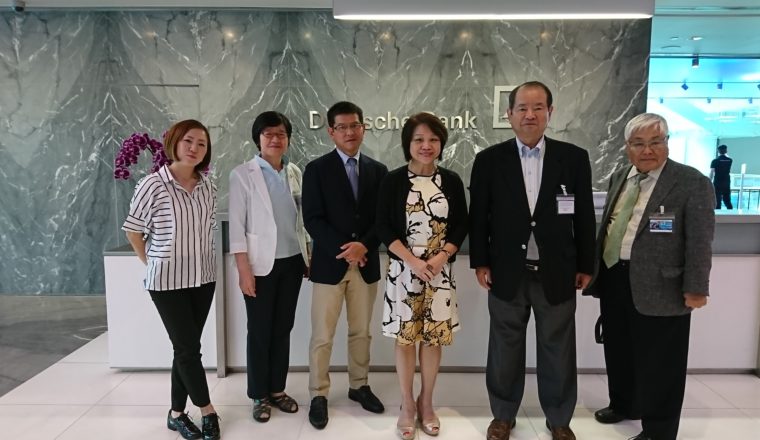
アジア・パシフィックコミュニケーションズ&社会貢献部部長・ディレクターのアニー・ヨーさん(右から3人目)
Interview with Ms. Annie Yeo, Director/head of corporate Social responsibility, Asia Communications& CSR, ASIA Pacific (3rd from right)
シンガポールメセナ視察ツアー 概要はこちら
アセアン諸国における企業メセナの促進と、各国をつなぐプラットフォーム形成を目指した国際交流プロジェクトの最終年度としてシンガポール視察ツアーを実施しました。シンガポールを拠点としている多国籍企業が、現地の地域やコミュニティのために芸術文化支援を行っている先進的事例を視察し、意見交換を行いました。
Singapore Tour Outline
We conducted a Singapore tour as the final year of KMK’s (Kigyo Mecenat Kyogikai: Association for Corporate Support of the Arts) 3-year project, we have organized the continuous series of implementing research, mutual exchanges and conferences in collaboration with Southeast Asian countries, since early 2015 called ‘Research and Conference in Facilitating Corporate Mecenat Activities and Establishing a Network in ASEAN Countries’.
————————————————————————————
ドイツ銀行
1870年にベルリンで創業し、現在は、フランクフルト・アム・マインに本社を置くメガバンク。1880~90年代にドイツ国内最大の銀行へ成長。1979 年より現代美術のコレクションを開始し、現在 6 万点以上の 作品を所有している。ギャラリーだけでなく、社屋の廊下やオフィス 内に作品を展示し、社員にとってアートが日常的にある環境をつく っている。主な展示は、版画、ドローイング、ペインティング、コラージュ、写真などの平面作品。今回訪れたシンガポールはアジア・パシフィック地域の本社である。
Deutsche Bank (Asia Pacific Headquarter in Singapore)
Founded in Berlin in 1870, currently a megabank headquartered in Frankfurt am Main. It grew into the nation’s largest bank in the 1880-90s. The bank started collection of contemporary arts since 1979, currently possessing more than 60,000 works. Works are displayed not only in galleries but also in corridors and offices of company buildings, creating an environment where art is a daily work for employees. Major exhibits are planar works such as prints, drawings, paintings, collages and photographs. Singapore Branch is a regional headquarter of Asia/Pacific region.
*インタビュー対応者 | Interviewees
アニー・ヨー(アジア・パシフィックコミュニケーションズ&社会貢献部部長・ディレクター)
Ms. Annie Yeo (Director/head of corporate Social responsibility, Asia Communications& CSR,ASIA)
————————————————————————————
ドイツ銀行のアートコレクション
ヨー:私たち、ドイツ銀行は世界規模で10万人に近い社員を抱える大企業です。特に絵画・美術コレクションが有名かと思いますが、私たちは、世界で6万点以上の芸術作品のコレクションを持っており、多くの場所で展示・使用されています。芸術を多くの人に届けることが大切だと考えていますが、美術館を所有し展示しているということではありません。ベルリンには小さなギャラリーがありますが、とても小さなものです。一方で、私たちは非常に多くの作品を持っているので、ほとんどのアート作品は世界にある900のオフィスに分散されて置かれています。コレクションは、ほとんどが紙の現代美術作品です。現在は、少数の写真、インスタレーション、および混合メディアも少し所有しています。
Annie: Deutsche Bank is a big corporation, with close to 100,000 employees globally. And we are very strong in arts, especially our collection. We have more than 60,000 pieces of art works in the world, and our art works are being used in many areas. We believe making arts accessible to the public is very important, however we are not a museum to show them. Although we have a small gallery in Berlin, it is very small. Then on the other hand, we have so many pieces, so whatever we do, most of art works are in our offices, like 900 office. So our collection is mostly on contemporary art and mostly on paper. We have now a small number of photographs, installations, and mixed media. But mostly on paper.
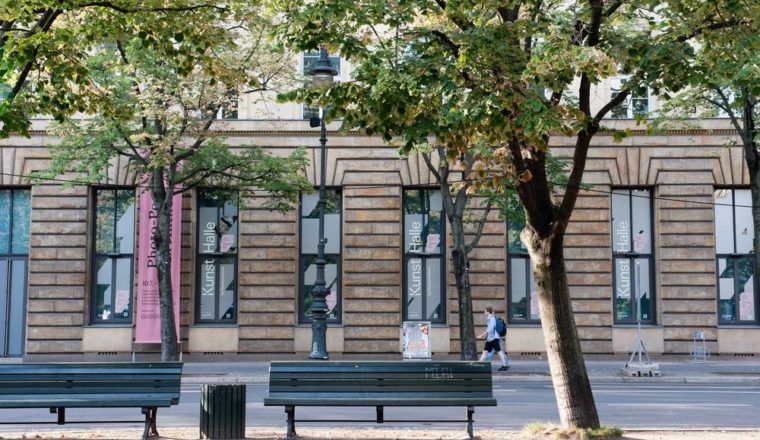
ベルリンにあるドイツ銀行所有のアートホール
Kunst Hall by Deutsche Bank in Berlin
これはベルリンにあるギャラリーです。コレクション作品はすべて私たちのオフィスにあり、巡回展も展開しています。ドイツ銀行展示会は世界中を旅しており、おそらく4-6回の展覧会が同時に行われています。また、私たちは芸術祭をスポンサードし、アウトリーチ活動も展開しています。出版物を出したり、芸術誌、ウェブサイト、SNS、アプリケーションもあります。私たちは毎年アートカタログを作っていて、人々は私たちのコレクションのカタログを購読して購入することができます。これは60あるパートナーの美術館とカタログを作成しているものです。私たちはまた、芸術カレンダーなど、かなり大きなものを発売しています。
So this is our museum in Berlin, and all the works are in our offices, and we also have exhibitions that travels. Deutsche Bank exhibition travels around the world. So probably 4-6 exhibitions going around at the same time, and we sponsor art festivals, and outreach works as well. We have publications, we have arts magazine, website SNS, application as well. We have also art card every year, people can subscribe and purchase the card which are from our collections. But this is with our 60 museum partners to create this art cards. We also do arts calendar, quite big one.
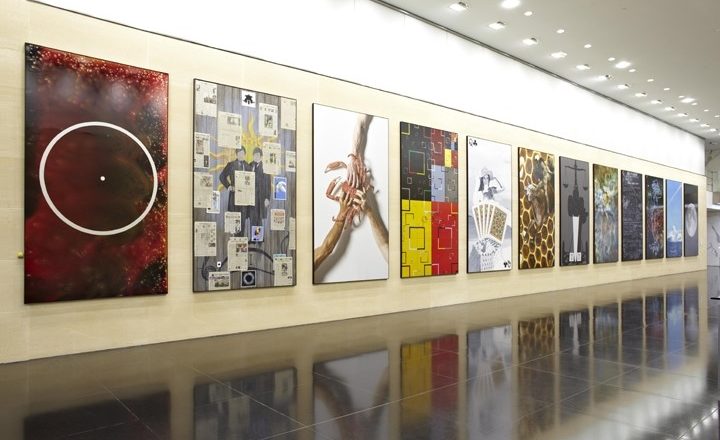
ドイツ銀行のアートコレクション|Art Collection owned by Deutsche Bank
ドイツ銀行は芸術が創造性をひきだし、芸術そのものが人々に考える力や様々なことに対する解決策を与えてくれると信じています。これは、芸術を芸術として鑑賞するだけではなく、あらゆる分野に応用することができます。つまり、職場や家庭でも、という意味です。
We believe that arts hostess creativity, and that arts allow people to think out of the box, and that good solutions come out of it. This is not just applying to arts as in arts, but it can apply to any disciplines. Meaning there is at work, or at home, so that is why the bank believes lots in supporting arts.
シンガポール企業における社会貢献活動の位置づけ
―― そういう中でシンガポール特有の位置づけとかはあるのでしょうか?ヨーさんはシンガポールだけでなくアジア全体を見なくてはいけないお立場かと思いますが、アジアの中でもシンガポール企業がこういった社会貢献をやるということに関してどのような受け止め方をしているでしょうか?
Q: So considering this, what is the role or characteristic of Singapore? You, as a head of Asia Pacific Region, need to oversee the whole Asia, but how do corporations in Singapore think about Social Contribution activities?
ヨー:シンガポールは非常に若い国ですが、急激に成長を遂げた国でもあります。多くの芸術活動が行われています。その活動は非常に活気があり、さまざまなアートイベントがそこらじゅうで起こっています。また、シンガポール政府が、人々の芸術寄付を手助けするために多くのことをしてくれています。芸術団体に寄付すると250%の税金控除を受けることができるからです。もし、100ドルの寄付をした場合、税対象となる所得から250ドルを免税してくれるということになります。
だから、たくさんの人がシンフォニーオーケストラ、演劇演奏などのスポンサーに熱心になりました。
Annie: Singapore is a very young country, only found in 1959. Then again it has become a vibrant country. A lot of arts activities are happening. And I really attribute to the government in Singapore for doing a lot to help people to donate to arts. Because if you donate to arts organizations, you can get 250% tax relief. Because you can get tax relief, and the government does a lot. If you donate 100 Singapore Dollar, whatever your taxable income, you get 250 dollar off. So a lot of people became keen to sponsor like symphony orchestra, performing theatre etc.
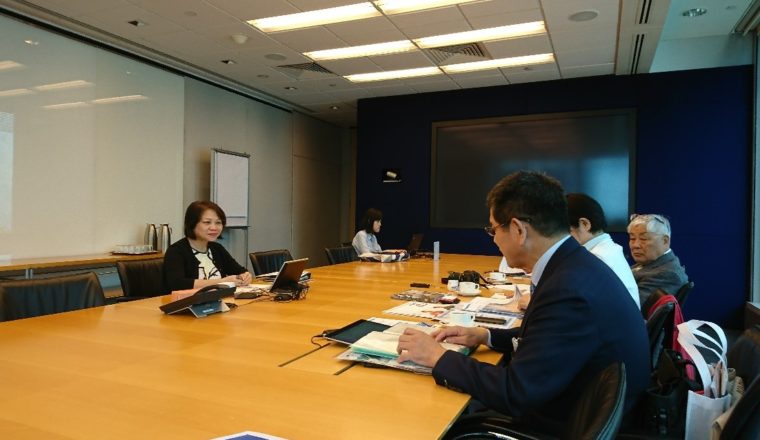
シンガポールオフィスでのヨーさんとのミーティング
Discussion with Ms. Yeo at Singapore Office
――シンガポールで色々な社会貢献活動をするということは企業としても手ごたえを感じるものだと考えていいのでしょうか?
Q: So for corporations to implement any CSR activities in Singapore, it is very fulfilling right?
ヨー:もちろんです。また、企業には芸術に寄付すると認知が広げられるような政府の政策があるのです。そのため、毎年ナショナル・アーツ・カウンシルには、芸術に寄付する企業や個人に賞を与える「パトロン・オブ・ザ・アーツ」と呼ばれる賞もあります。それは名誉ある年次イベントです。上級蔵相が賞を授与し、新聞の全面で謝辞を述べ全国的に認知されるのです。
Annie: Of course. And also for corporations when you donate to arts, you get recognition as a government scheme. So National Arts Council, every year, also has an award called ‘Patron of Arts Award’ that rewards corporations and individuals who donate towards arts. It is a prestigious one-year annual event. Senior minister gives out the award, and acknowledgement in a full page newspaper.
しかし、ドイツ銀行は認知されるために支援をしているわけではなく、私たちは芸術、特に若いアーティストをサポートするプログラムを本当に信じているからこそ支援しています。
But Deutsche Bank does support because of recognition, but we do it because we really believe in arts, especially programs we support young artists.
アジア・パシフィック部門のCSR
しかし、芸術を支援することは困難です。実際にこのドイツ銀行では、フランクフルト本社によって管理されているアート・カルチャー・スポーツ部門があります。しかし、彼らがどんなことをしても、アートプログラムをサポートしてくれるビジネスサイドの理解が必要です。時にビジネス面で予算が少なければこういったプログラムをサポートしないのです。しかし、みんな芸術のよさを知っています。しかし、ビジネスが芸術をサポートするには、本当に創造的なプログラムでなければなりません。私たちのアジア・パシフィック部門では文化芸術プログラムなどの予算があまりないので常に努力しています。私たちはビジネス領域や他の人々に意味のあるプログラムを提供するためにCSR(社会貢献)の要素を取り入れています。
Sometimes, it is difficult to support the arts. Actually in here at Deutsche Bank, the arts is managed by Britta’s department called ‘Arts, Culture, Sports’ in Frankfurt. And whatever they do, they would also need support of the businesses to help them create programs. Quite often, the businesses, if the budget is tight, they do not really support. But everybody sees arts as nice to have. But so we have to be really creative if one business to support. We always are trying, especially in Asia, where we don’t have much budget on art, culture, or kinds of programs, we put element of CSR so that we will get business and other people to help us to make it a meaningful program.
アジアの芸術プログラムでは、資金と市民参加を得るため、社会貢献-慈善団体としての要素を含める必要があります。例えばシンガポールでは、シンガポールのチャイニーズオーケストラと一緒に、障害児のための音楽奨学金制度を展開し、正式な音楽訓練や、チャイニーズオーケストラとの訓練に取り組んでいます。毎年、オーケストラとチャリティーコンサートを行います。子ども達は、オーケストラの中心ステージで演奏します。そして、今年が4年目です。
So usually arts programs in Asia, we try to get funding and participation so we have to include the elements of CSR- charity, so here in Singapore for instance, we have been working with Singapore Chinese Orchestra in music scholarship for disabled children to go to formal music training, and also to train with professional Chinese Orchestra. Every year, we do a charity concert with Chinese Orchestra, where these children perform at center stage with the orchestra. And this is the fourth year we are doing that.
これは私たちがしばらく支援している別のユニークなプロジェクトです。私たちは‘オール・エイジ・オープンハウス’のメインスポンサーです。これは本当に芸術鑑賞ツアー(アート・ウォークアバウト)のようなものです。家の所有者の許可を得て、一般市民の家に若手アーティストの作品を展示します。大体毎年2月か3月にかけて6週末アートツアーを展開しています。もちろん、参加者はチケットを買わなくてはいけません。そして、他人の家に行き芸術作品を鑑賞し、また近隣住民と話をすることで、その地域で起こっていることやトレンドなどを話すことができるユニークなツアーです。
This is also another unique project we have been sponsoring for a while, we are the founder sponsor for all age open house. So this is really a arts-walkabout, there are art works in people’s houses, so they have permissions from houses’ owners to hang up works of young artists, and they conduct a tour over 6 weekends, in the beginning of February or March every year. So people have to pay to go and do this walk-about. And they can go into someone’s house to appreciate arts and also to talk about neighbourhood, what is interesting and unique about this neighbourhood. So tour, arts appreciation.
このオープンハウスには2人の創業者がいますが、1人は私たちの専務理事であり、彼はここで働いています。彼はシンガポールにこのプログラムを導入しました。彼はドイツ出身です。彼はシンガポールに来て仕事をしましたが、たくさんのアイデアを持っていてこのオープンハウスを非営利組織として始めました。
This Open house have a two founders- one is our managing director, and he works here. So he introduced this program to Singapore, he is from Germany. So he came to Singapore to work, but he has a lot of ideas, and he started Open House as Non-Profit organization.
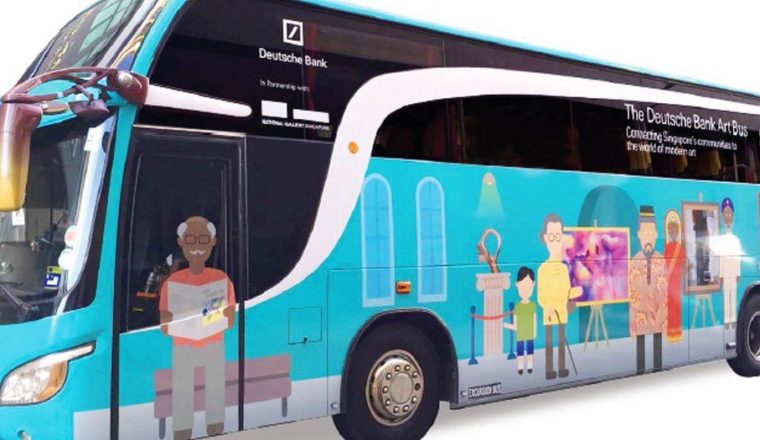
ドイツ銀行アートバス| Deutsche Bank Art Bus
また、シンガポールの別のプログラムは、これは長年にわたり、ドイツ銀行アートバスと呼ばれています。私たちは銀行のロゴが付いたバスを借りて、シンガポール国立美術館に年配の人を連れて行きます。シンガポール国立美術館はただの美術館だけではなく、お年寄りが楽しめるものでもありますよね。かつては若者や子どものためのものでしたが、今では美術館ではこの種のアートツアーは多くの学校プログラムで用意されているので、高齢者にはこのような機会があると言いと思い始めたのです。このバスを利用して博物館に来る老人たちは、慈善団体を介さなくてはなりません。なぜなら、これらの慈善団体はバスを使うためにナショナルギャラリーに登録しなければならないからです。
And another program in Singapore, although we have lots of programs running, but showing some of key programs, is long-standing initiative called Deutsche Bank Art Bus. We hire a bus with all Bank’s branding on it, and bringing old people to the National Gallery of Singapore, which is more than just an art museum here, so elderly can go to museum and appreciate arts in the museum. It used to be for younger children, but now the museum told us that younger children have a lot of school programs for this kinds of art tour, so now older people would like to have this kind of opportunity. So old people coming to the museum must come from a charity, because these charity have to register them with National Gallery to use the bus.
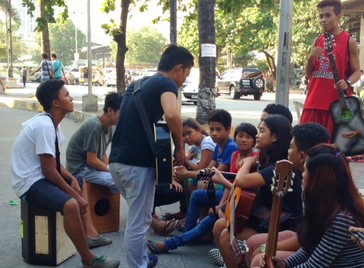
フィリピンでの音楽教育プログラム|Rock-ed started in 2009 in Philippines
フィリピンでは、フィリピン人は芸術と音楽でとても優れているので、私たちはかなりのプログラムを展開しています。このプログラムでは、ストリートチルドレン、つまり家のない子どもたちを対象にしています。ドイツ銀行の社員がボランティアとなり、これらの子どもたち約50人をオフィスに招待しています。私たちは2009年にこのプログラムを開始し、ボランティアは歌を歌う方法、ダンスをする方法、音楽を覚える方法を子ども達に教えています。
私の同僚も教えていますよ。数年後、ストリートチルドレンは非常に優れた演奏者となり、ロックバンドを結成し、他のストリートチルドレンのための支援金を得るためチャリティーイベントやファンドレイズイベント等で演奏しています。
In Philippines, we do have quite a lot of programs, because they are very good with art and music. This program for instance, we work with street children, children who have no homes, and our volunteers in our bank, reach out to these children, and invite them around 50 of them to our office. We started this program in 2009, and our volunteers teach them how to sing, dance, and learn how to play music. My colleagues, our employees teach them. So many years later, street children became very good and they formed a rock band, and started to perform at charity events to raise money for other street children.
またもう一つ、マニラでのプログラムは、アプリシエイティング・アートと呼ばれています。あまり知られていないアーティストを招いて、マニラにあるドイツ銀行オフィスロビーに作品を掲載します。そして、私たちの同僚は、これらのアーティストに自分の作品について話をする機会を提供しているのです。これには私たちの社員だけでなく、建物内の他の人たちも参加できます。芸術家が作品を売ると、一部の売上金が恵まれない子どもたちに芸術を教えるプログラムに寄付されます。
Also another program in Manila is called Appreciating Art- where they invite less-known artists to put their works around our office lobby. And our colleagues have these artist to talk about their works- so not only for our workers but also other people in the building, once the artists sell their works, a portion of the money is donated to the program to teach arts to disadvantaged children.
また、ビエンナーレをサポートしています。それほど多くはありませんが、世界中で6つぐらいサポートしています。私たちは実際にそこで彫刻作品を購入したことがあります。このオフィスの入り口にある貝殻のような彫刻がそうです。それからドイツ銀行コレクションの展示会ももちろんしています。銀行主導の取り組みであり、博物館と協力してコレクションを発表しています。また、美術館と協力して、市民や子どもたちが参加するためのアートプログラムを開発しています。
And then we support arts biennale- not much, but some around 6 in worldwide. We also bought a public sculpture from one of them, which is displayed in the downstairs at the entrance. We also do collection to travel exhibition. This is our initiatives, work with the museum to co-present our collections. We also work with museums to develop art programs for public and children to participate.
―― 日本では引きこもりの子ども達が社会問題になっていますが、そういったことはシンガポールでありますか?そういった人たちに対するプログラムなどはありますか?
Q: In Japan, shut-in children with social withdrawal has become a social problem. Do you have similar problem in Singapore? And do you have any activities for these children?
ヨー:正直にいうと、あると思います。私たちは慈善団体と仕事をしていますので、その慈善団体がカウンセリングが必要な子どもがいると言えば、私たちはできる限り手伝っています。しかし、我々は専門家ではないので、そういったプログラムを主導・支援できる団体やグループが必要ですが。
Annie: To be honest, there are. And then for our Bank, and our CSR, we work with charities, so if they tell us there are some children who needs counselling and so on, we do try everything we can to help. But then again, we are not specialist, we need experts to help us.
現在、シンガポールの40の慈善団体、アジア太平洋では200の団体と協力しています。彼らのほとんどは若者のためのプログラムを提供しています。これまで引きこもりの子どもたちを扱う慈善団体とは仕事をしていませんが、両親が刑務所に居た子ども、学校の仕事の助けを必要とする子どもたちのために働く慈善団体、そこで、私たちはこれらのプログラムをサポートします。
So we work with 40 charity partners in Singapore, 200 in Asia Pacific. Most of them are coming with programs for younger people. So far, we haven’t worked with charities who deals with children who don’t come out, but we work with charity who works for children whose parents are in jail, who needs help with school work, with how they look at things. So we support these programs.
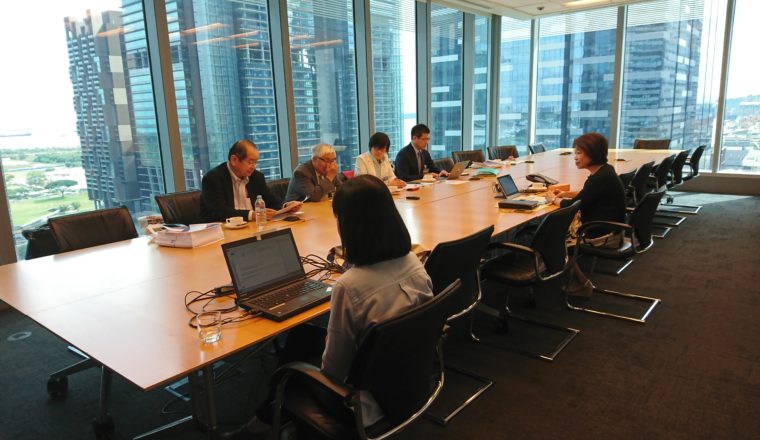
シンガポールオフィスでのヨーさんとのミーティング
Discussion with Ms. Yeo at Singapore Office
―― こちらはアジアの本社だとは思いますが、日本とシンガポールの違いは何かありますか?
Q: Is there any difference between Singapore and Japan?
ヨー:確かにここシンガポールはアジア本社ではありますが、東京のオフィスも大きいです。実際、私たちはアジア太平洋の15の市場でプログラムを展開していますが、私たちは市場によって違うさまざまなプログラムを行っています。しかし、彼らはすべて同じ戦略的な柱をベースにして展開されています。「Born to be」というプログラムは、24歳未満の若者の夢を実現するための教育へのアクセスと、彼らがしたいことを支援するのが私たちのひとつの目標です。 シンガポールでは様々なプログラムを行っていますが、東京でも似たようなプログラムを行っています。ドイツ銀行の社会貢献の信念として、ただ単に寄付金の小切手を書くということではなく、私たちがプログラムを支援する場合、社員すべてにプログラムのことを知ってほしいと思っていますし、プログラムに参加してほしいと思っています。実際、多くの社員がボランティアとして様々なプロジェクトに関わってくれています。
Annie: So Singapore is the regional office, Tokyo is a big office too. In fact, we work in 15 markets in Asia Pacific, all 15 markets, we do different programs. But they all alien the same strategic pillar. So just you saw ‘born to be’ is one of our objectives to help young people under the age of 24, access to education to realize their dream, and what they want to be. Here in Singapore we do programs, but in Tokyo we also do similar programs. For Deutsche Bank, when it comes to CSR, it is never about writing a cheque for donation. When we sign up to the program to support, we want our employees to know, and to come and support our programs. We have many volunteers to help as well.
私たちが成功を収めているのと思うのはやり方だと思います。毎月のニュースレターを全社員に送ります。私たちは内部でスタッフとたくさんのコミュニケーションをしています。だから私たちは支援プロジェクトがあり、ボランティアが必要なときは、社員すべてに電子メールを送ります。だから私たちにとって密なコミュニケーションをとることは、他の社員にプログラムを知ってもらう上でも大切なのです。
The way we are quite successful is because we disseminate monthly newsletter. We have a lot of communications with staff internally. So when we do activities and need volunteers, we send emails to everyone if anyone can volunteer. So we have communication to make them aware.
―― 芸術以外の支援もされていますか?
Q: Do you offer any support other than arts?
ヨー:たとえば、「Born to Be」では24歳未満の若者のためのプロジェクトであれば、たとえミュージシャン、シェフ、スポーツでも支援します。面白いことに先週、私はインドネシアにいましたが、ストリートチルドレンと働くチャリティー団体と会っていました。私たちは長年この団体と協力してきました。4年前、私たちは子どもたちが教育や訓練を受けることができるよう経済支援をしたのですが、彼らは学校に行きたくない、それよりも自分のサッカーのスキルを上達させたいということだったので、サッカーを学ぶためのプログラムを作成しました。実際に来年、9人の男子チームがワールドカップのストリートサッカーにインドネシア代表としてモスクワに行く予定です。
Annie: Under the born to be, as long as we work for youngster under 24, say musician, chef, sports, we support. When you spoke about sports, last week I was in Indonesia, I met with a charity partner who works with street children, we have been working with this partner many years now, 4 years ago we gave money to allow children to access to education and training, some of them don’t want to go to school, they want to play football to develop their skills. So we did a program to help them learn how to play football better. Actually next year, team of 9 boys are going to Moscow to represent world cup street football.
スポーツを通して、これらのストリートチルドレンはより規律が高まり、より責任を持ち、彼らにとって何が重要なことが自分自身で分かるようになりました。そして彼らは今学校に行っています。スポーツを通して、彼ら自身を助けることができたのです。
Through sports, these street children become more disciplined, they become more responsible, and they know what is important to them. And they go to school now. Through sports, it has helped them personally.
―― シンガポールでは何人でこの部を回しているのですか?
Q: How many people are working in this department?
ヨー:3人だけの、非常に小さなチームです。しかしながら、先ほども申し上げたように15の市場には日本やタイなどにオフィスがありますし、各事務所のトップが私たちと協力してくれていて、社会貢献委員会を形成しています。ただし、彼らは私たちのようなフルタイムスタッフではなく、普段は他の部署で働いています。しかし、私たちとともにプログラム構成を考えたりなどミーティング等に時間を割いてくれているのです。また、各オフィスでプログラムを展開する場合には、事前に私たちに知らせます。なぜなら、その慈善団体と一緒にプログラムを行って大丈夫かなどというチェックが必要だからです。
Annie: Very small team with three of us. But having said that, we work in 15 markets, so every market has a office like Japan, Thailand, we work with the chief head of each office, and we have a committee CSR committee, they are not full-time CSR like us, but they are all bankers doing different things in our Bank. They give time to sit with us to come up with programs. But they check with us first before they do anything, because we have to check with charity partners to make sure they are ok to work with.
―― 日本では各地域に自治体があり、そこには教育部門があって役所が税金を使って子どものプログラムをしているので民間があまり育っていないという現状があります。差別化されてしまうため、貧困の子ども達に対してそういった民間のプログラムができないのです。こちらではどういう風にして選ぶのでしょうか?
Q: In Japan, we have many local authorities with education departments. They use our tax to create children’s programmes. That is why there is no growth in private sectors in this field. If any programmes related to poverty or disabled, they are considered to be discrimination for some reason. How do you choose the program to support and not to support?
ヨー:ドイツ銀行としては慈善団体と一緒に進めていくことを前提としています。個人とということはできません。たとえば孤児を支援する慈善団体を探し出し一緒にプログラムを進めなくてはいけません。ですから団体が私たちが支援できるプログラムを企画できるようになるのです。
Annie: Our bank always has to work with charity partners. We don’t work with individuals. We need to reach out a charity who looks after street children, so they can come up with programs so we can support them.
―― 日本では企業がメセナ活動に対して短期的見返りを求める傾向がありますが、シンガポールではこういった支援が意味のあるものだと捉えていますね、それはなかなか目に見えないものですし長期的な視点だと思います。逆に短期的見返りを見せなくてはいけないようなプレッシャーはないのでしょうか?
Q: In Japan, corporations tend to look for more short-term return, but in Singapore these types of long-term programmes seem to be considered as meaningful. These long-term return cannot be measured with numbers. Is there any pressure to give a number or short-term profit?
ヨー:幸いなことに、ドイツ銀行自体が慈善事業(フィランソロピー)の理念を深く信じています。良いことをすることや社会貢献活動を行うことは、このドイツ銀行のDNAの一部であるため、短絡的な結果は期待していません。何よりも私たちはそれを信じていません。人と社会に投資しなければなりません。
Annie: Fortunately as a Bank, we believe lots in philanthropy. We have a long history of doing good. Doing good or doing CSR is a part of the bank’s DNA, so we don’t look for immediate result. We don’t believe in that. We have to invest in people and society.
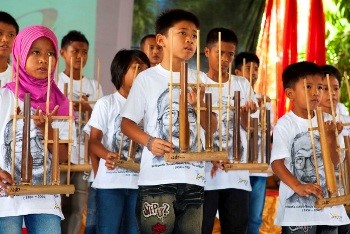
インドネシアの慈善団体と協力して行っている教育プログラム
The Bank’s supporting program with local NPO which seeks to remove children from the streets and give them an education.
例えば、インドネシアのストリートチルドレンの場合と同様に、慈善団体によれば多くの支援団体はわずか1年間のみ資金を提供していると言われていますが、1年後にはその結果を見ることはできません。不可能です。それは公正ではありません、だからこそ私たちは常に最低3年の支援を保証しています。3年後に潜在的な可能性があると思えるときは、このプログラムをさらに支援しています。そういった良いプログラムは、多くの人が自分の人生を変えたり、良くしたりするのを助けるのです。ですから、私たちの支援しているプログラムの中には10年を超えるものが多くあります。
Just like the case of street children in Indonesia, the charity tells us a lot of people give them a funding for only a year, but with one year we cannot see the result. It is not fair, so for us, it is always a minimum of 3 years. We make sure that the projects and programs get time to grow, and for outcome to be achieved. And then when we see after 3 years, the potential, we will further support the program. So there are a quite few programs under our framework that has gone to 10 years, because they are such a good program and helping a lot of people transform their lives and change their lives.
私たちはパートナーとなる慈善団体と一緒に仕事をしています。短期的見返りは公正ではないので、私たちは迅速なKPIを信じていないのです。特に、非常に難しい子どもたちと一緒に働くコミュニティやプログラムでは、彼らがすぐに変わるのは非常に難しいからです。例えば、孤児や家のない子どもであれば、彼らは非常に自由な人生を送ることに慣れています。だから、彼らに無料の訓練を与えれば、彼らは自由な生活を逃すので参加したいとは思わないのです。そして時間がかかってやっと彼らは「学ぶために戻ってくる必要がある」ことを認識するようになります。したがって、慈善団体にとっても容易ではありません。
So we carry of working with the charity partners. So we don’t believe in quick KPIs because it is not fair. Especially in the community where we work with very difficult children, it is very difficult for them to turn around quickly. Because you know, if they are street children, they are used to having a very free life outside. So if we give them free training, they just want to go out because they miss the free life. So only when they go out, they realize that ‘oh dear, need to go back to learn something useful’. And they go back. So it is not easy for charity partners as well.
―― とても参考になりました。今日はどうもありがとうございました。
Q: I see, it was very interesting. Thank you very much for today.
ヨー:ありがとうございました。
Annie: Thank you very much.
インタビュー2017年11月8日
Interview held on 8 November 2017
